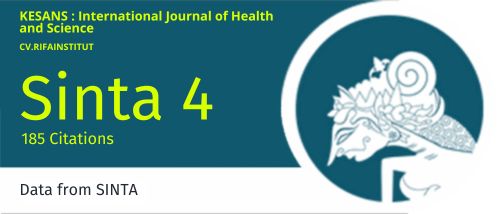Relationship Between Pregnant Women's Knowledge and ANC (Antenatal Care) Visits at Majalaya Community Health Center in 2024
DOI:
https://doi.org/10.54543/kesans.v4i7.352Keywords:
Knowledge, Pregnancy, ANC (Antenatal Care)Abstract
Antenatal Care (ANC) constitutes a professional health service provided by healthcare workers such as obstetricians, general practitioners, midwives, and nurses, aimed at maintaining maternal and fetal health. Although the K1 coverage rate achieved an increase to 97.7% in 2022 compared to 2020, the K4 coverage rate showed a decline to 90.94% (Ministry of Health, 2022). Adequate knowledge among pregnant women regarding ANC is crucial for ensuring regular antenatal visits, ideally conducted at least six times throughout the pregnancy (Ministry of Health of the Republic of Indonesia, 2020). This study aims to examine the relationship between pregnant women’s knowledge and the frequency of ANC visits at the Majalaya Health Center. Employing a quantitative approach with a cross-sectional design, data were collected from 53 pregnant women. The findings revealed that 41.5% of respondents had limited knowledge, and 58.5% reported irregular ANC visits. Statistical analysis using the Chi-Square test yielded a p-value of 0.001 (p < 0.05), indicating a significant association between knowledge levels and ANC visit regularity. These results emphasize the importance of enhancing educational interventions to improve ANC attendance among pregnant women
Downloads
Published
How to Cite
Issue
Section
Citation Check
License
Copyright (c) 2025 Virna Ghasyiyah, Nura Azizah

This work is licensed under a Creative Commons Attribution-ShareAlike 4.0 International License.




















